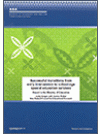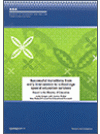When children transition from early intervention to school-age specialist services, Ministry of Education (Ministry) staff play a critical role in ensuring an effective transition—both across services and across learning contexts. Guidelines, specialist standards and locally developed protocols provide a framework for the transition process.
In 2012 the Ministry released a Request for Proposals (RFP) to understand more about transitions from Early Intervention (EI) into school-age services for children with high levels of special learning needs. The Ministry wanted “on the ground” perspectives about effective and ineffective transitions using a case-study approach. NZCER was contracted to undertake this research.
This research focused on the Ministry role/s in supporting transitions, on children’s transitions to school and the associated transition from EI to school-age services specialist support.
The data from the case studies have been analysed for key themes; this report summarises the findings from 14 case studies. The case studies were drawn from four Ministry offices across two Ministry regions.
In this series of case studies, some of the students with the most challenging needs have had very effective transitions. Some (but not all) of the children who appeared to have less-challenging learning and social needs at the time of transition had less-effective transitions. Sometimes, less-effective transitions were related to the amount of time available to plan and undertake the transitions.
Purpose
The purpose of this report is to explore what is currently ‘not working’ in transitions from EI to school-age services from the perspectives of people involved in these transitions—to identify ‘what we can do better’ and explore how to improve transitions and outcomes for young people—to identify ‘what we do well’ and ‘what needs to be changed, and how’.


